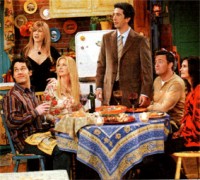Last semester, a student of mine wrote a paper which followed none of the requirements of the assignment, but was fascinating nonetheless. As the result of a group project requiring students to do a content analysis of a show, he was describing the dominant values portrayed on the long-running and mediocre at best sitcom, Friends. In his paper, he quoted a 2004 reconsideration of Friends in Time magazine:
Back in 1994–that Reality Bites, Kurt Cobain year–the show wanted to explain people in their 20s to themselves: the aimlessness, the cappuccino drinking, the feeling that you were, you know, “always stuck in second gear.” It soon wisely toned down its voice-of-a-generation aspirations and became a comedy about pals and lovers who suffered comic misunderstandings and got pet monkeys. But it stuck with one theme. Being part of Gen X may not mean you had a goatee or were in a grunge band; it did, however, mean there was a good chance that your family was screwed up and that you feared it had damaged you.
This quote particularly resonated with me, despite the fact that I was 13 in 1994 and not a late 20-something. Ever since, the concept of generations has been gnawing at me. According to Strauss and Howe’s Generations, Generation Xers were born between 1961 and 1981. Defined by being the first post-Baby Boom generation, Gen X has lived in the shadow of the 60s generation and, in general, has seen less success and prosperity than their parents despite coming of age in the generally prosperous 80s and 90s. For many children of divorce in Gen. X, like the characters on Friends, they were reluctant to marry at a young age. I was born in the final year of Gen X and the cultural stuff of coffee shops, goatees, and grunge rock were aspirational — not lived experiences — for me and my peers. If Generation X’s quintessential movie is Reality Bites, Lost in Translation spoke more to people my age.

The supposed next generation, Generation Y, the Millennials, or the Net Generation, according to the wisdom of Wikipedia, were born “anywhere between the second half of the 1970s … to around the year 2000.” This huge window includes both me and my students (many of whom were born in 1990) and is not a generation to which I feel particular attachment. While I can remember life before the Internet, most of them cannot. While I was molded politically in the Clinton era (free from major foreign threat), they have come of age during Bush’s War on Terror. By most survey indicators, they are relatively more conservative and more eager to get married and reproduce than Gen. Xers.
My own relative confusion about which generation I fit into is, I think, more broadly revealing. Does anyone ever feel completely attached to the constructed identity of a generation? Is “generation” even an intellectually useful concept or should social scientists limit ourselves to the empirical measure of “age cohorts”? If, indeed, the notion of generations is useful, what might be some useful parameters for defining them?
